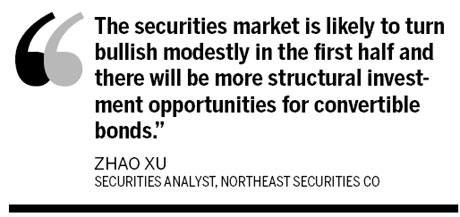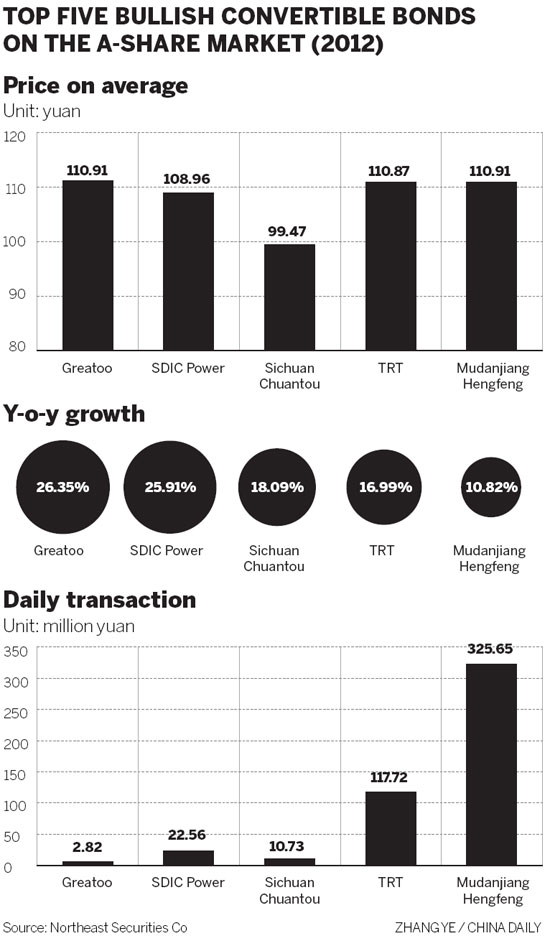

|
Investors are being advised to hold more convertible bonds than debentures this year in their investment portfolios, according to Xu Xiaoqing, an analyst with the China International Capital Corp. Qi Wen / For China Daily |

Return rate may be as high as 6 percent in the first six months
The expected rebound of the Chinese securities markets in 2013 is likely to bring investment opportunities for convertible bonds, as economic growth may be at a faster rate compared with 2012, analysts said.
The Shanghai Convertible Bond Index has risen for eight consecutive weeks since Nov 19, 2012. During the week starting on Jan 6, the index was boosted by 0.48 percent, taking it to 284.63 at the close on Friday. Meanwhile, the Chinese stock benchmark index slipped 1.49 percent to 2243.
At the end of last year, the S&P China Convertible Bond Index, a benchmark indicator of the vitality of the nation's convertible bonds, showed an increase of 4.6 percent, the first gain in three years, following the 12.1 percent decline in 2011 and 3.9 percent fall in 2010.
By contrast, the government loan provided a return of 3.3 percent and the corporate bond brought a 7.3 percent gain to investors in 2012. In the meantime, shares included in the Shanghai Composite Index delivered a 5.8 percent return inclusive of dividends, according to Bloomberg News.
Convertible bonds can be converted into a predetermined amount of the company's equity at certain times during their life. Essentially it is a bond with a stock option.
Currently, convertible bonds issued by 15 companies are trading on the Shanghai Stock Exchange. Another six companies are trading them on the Shenzhen securities market.
Investors are being advised to hold more convertible bonds than debenture bonds this year in their investment portfolios, according to Xu Xiaoqing, an analyst with the China International Capital Corp.
Xu predicted that in the first half of this year, the convertible bond return rate may increase to as high as 6 percent, as economic growth shows signs of a moderate rebound, with an expectation of increasing inflation pressure and relatively eased monetary policy, elements that favor equity investment.
China's major industrial companies saw profits rise 22.8 percent from a year earlier to reach 638.5 billion yuan ($102.66 billion) in November, outstripping the 20.5 percent recorded in October and the 7.8 percent in September, according to data from the National Bureau of Statistics.
Rising industrial profits, together with other indicators including the manufacturing Purchasing Managers' Index and industrial output, show that the world's second largest economy is gaining steam after slowing for seven consecutive quarters amid weak global demand.
Zhao Xu, a securities analyst with Northeast Securities Co, expects the operational conditions and net income for listed companies may remain on a steady growth track this year amid a recovery in the macroeconomy.
He forecast GDP growth may accelerate to 7.8 percent in 2013, supported by the remaining prudent monetary policy and proactive fiscal policy.
"The securities market is likely to turn bullish modestly in the first half and there will be more structural investment opportunities for convertible bonds," Zhao said. "The new leadership's determination for economic reforms and the urbanization policies will be a stimulus for the rebound of the securities market."
Chang Jian, an economist in China with Barclay's Securities, wrote in a research note that "urbanization can be a key driving force for the Chinese economy in the coming decade or two".
It will require more infrastructure and consumer goods and provide stronger growth momentum for the industrial and service sectors, she said.
Related to the convertible bond market, China's mainland stock market gained a cautious outlook from analysts this year.
"In the second half, it will be more stressful for the stock market and that will bring pressure to bear on convertible bond valuations," said Zhao.
The Shanghai Composite Index is likely to fluctuate between 2100 and 2600 this year, he predicted. The Chinese economy ended 2012 on a somewhat positive tone, with the Shanghai A-share index rising by 1.6 percent to 2269.13.
Besides the macroeconomy, the convertible bond market is also influenced by the bond supply-demand situation, said Xu from the CICC.
"The issuing pace for convertible bonds is likely to be slower than the market expectation in the first six months because the assessment value of the bonds is still at a low level," said Xu.
However, capital may increase faster in this market as the securities companies and fund management institutions including qualified foreign institutional investors are increasing convertible bond in their investment portfolios, he added.
chenjia1@chinadaily.com.cn

(China Daily 01/21/2013 page14)